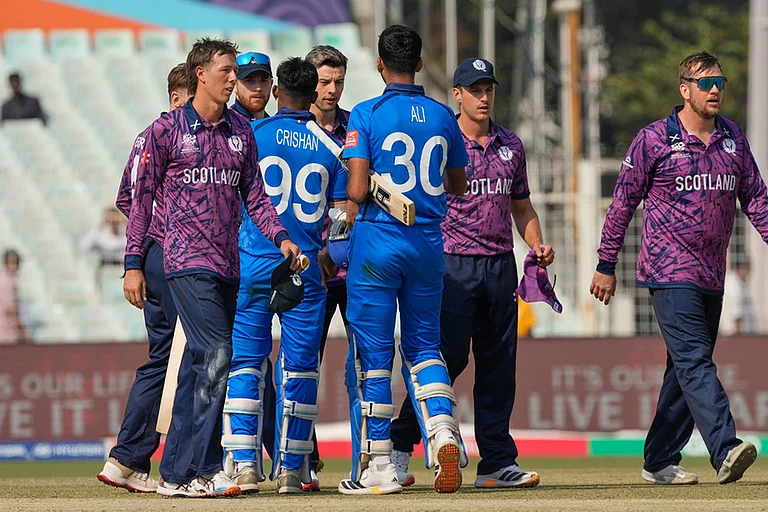WILL Communications Minister Beni Prasad Verma’s cowboy-like approach to the telecom tangle kickstart the basic telephone privatisation process? Not really, because financial institutions on whom telecom companies are depending for raising money are unanimous in their view that it will not be viable to operate basic telephone services as things stand today.
Telecom companies reluctant to sign the licence and interconnect agreements were virtually bulldozed into accepting Letters of Intent (LOIs) for statewide basic telephone services, after Verma issued his ultimatum on October 17: sign on the dotted line or lose your LOIs and face legal action. Five telecom companies, seemingly cowed down by Verma’s tough stance, fell in line, while one of them, the RPG-NTT-Itochu consortium is yet to accept the LOI for Tamil Nadu.
However, not a single telecom company has paid the first year’s licence fee, despite the 21 per cent penal rate of interest that the Department of Telecommunications (DOT) is going to charge with effect from October 18, when the last deadline for coughing up the first tranche expired. The bitter truth is that some of the companies in the race may not have the money to pay up even the first instalment. The magnitude of the financial crunch that telecom companies face can be gauged from the fact that the Essar-Bell Atlantic alliance has still not furnished its Rs 25-crore bank guarantee.
Says Z.A. Baig, director, Tata Communications Ltd, which formally accepted the LOI for Andhra Pradesh on October 23, five days after the deadline expired: "There are many problems to be sorted out, including the most crucial issue of viability of the projects, which have gone haywire because of new burdens like interconnection charges." Interconnection charges are the fees that DOT is demanding from service providers for connecting the private operators’ switches with its network. This charge was sprung on service providers just a few months back, without any prior intimation.
"Holding a gun to our head will not solve the many thorny problems confronting privatisation of basic telephone services," rues Baig. Agrees telecom consultant Mahesh Uppal: "The minister may soon regret his decision to act tough with LOI holders. Telecom companies seem to have been virtually forced to accept the LOIs without resolving the basic issue of viability. Even if licencees cough up the first tranche of licence fees, which follows automatically after acceptance of the LOIs, it will not be easy to raise money for building telephone networks."
The five consortia which have accepted the LOIs are Reliance-Nynex (Gujarat), Essar-Bell Atlantic (Punjab), Hughes-Ispat (Maharashtra), Usha India-Moscow Telecom (Bihar), and Tata-Bell Canada (Andhra Pradesh). The HFCL-Bezeq combine, which holds LOIs for Delhi, Haryana, UP West and Orissa, is out of Verma’s firing range as the company is in court challenging DOT’s bid to encash its bank guarantees. Industry sources say that this may just be HFCL’s ploy to opt out of the four circles for which it had made exorbitant bids involving licence fees of Rs 794 crore in the first tranche and Rs 27,790 crore in the entire 15-year licence period.
All-India development financial institutions like the IDBI, ICICI and IFCI had grave doubts over the viability of the telecom projects because of the high licence fees. And the interconnection charges have sent the bankability of the projects into a tailspin. At least one financial institution, ICICI, is said to have prepared an internal report stating that the new interconnection charges have rendered basic telephone services more unviable than before, say telecom industry sources.
Even after the 30-per cent reduction announced in September, India’s interconnection charges are thrice that of other countries where they are in force, according to Baig. The charges which were not mentioned in the basic services tender will increase the licence fee by at least Rs 1,000 crore over a 15-year period, complains Baig. Says he: "Our business plans and projections based on earlier calculations have all gone for a toss. We have reached the upper limit of our viability. Considering the scepti-cism of the financial institutions, where are we going to raise the money from to pay our licence fees and build networks?"
Thus, telecom companies seem to have accepted the LOIs without knowing what the next step will be. Says Vijai Kapur, chairman, CII Telecom Committee: "It is not a very comfortable position for the LOI-holders. The full impact of the interconnection charges is still not very clear with the DOT maintaining that the issue will be referred to the as yet unconstituted Telecom Regulatory Authority of India. And unless banks and FIs know exactly to what extent interconnection rates are going to hit viability, they will not lend money."
THOUGH the Communications Ministry has conceded the FIs’ demand that the licences should be made assignable to facilitate the securitisation of debt, the DOT will have the final word in the choice of a new service provider. FIs had not bargained for such conditions and wanted a freer hand in assignability as they were the ones who were taking the risks in lending to a sector where the arithmetic is still hazy. As Uppal opines: "FIs are known to be notoriously conservative and will not part with hard cash for nothing, especially given India’s bad regulatory record."
Under the circumstances, telecom companies cannot complete their projects’ financial closures, which need definite parameters and calculations. Hence, no real progress seems to have taken place in telecom privatisation, except for the flexing of muscles by the Communications Ministry. India is back to where it was when the tender for private basic telephone services was issued nearly two years ago. Of course, the rich who can afford to pay have cellular services in the four metros and preparations for mobile telephony in statewide circles are proceeding without much trouble.
But in the case of basic telephones, it’s a no-win, lose-lose situation. Bids were invited on December 31, 1994 for 21 basic telephone circles—Maharashtra, Delhi, Gujarat, Andhra Pradesh, Karnataka, Tamil Nadu, Haryana, Kerala, Madhya Pradesh, Punjab, Rajasthan, UP West, UP East, West Bengal, Bihar, Assam, Himachal Pradesh, Orissa, Jammu & Kashmir, and the Andaman & Nicobar islands. So far, LOIs have been accepted in five circles, less than one-fourth of the total. Telecom industry insiders reckon that only with lots of luck, basic services may start in three of these circles where the players have a sound financial position. The rest may fall by the wayside.
And why is India’s telephone privatisation process getting enmeshed in one tangle after another? First, because the restructuring of the telecom sector in India, easily one of the largest of its kind the world over, was undertaken without the required homework and before putting in place regulatory institutions. As a result, there was a lack of transparency and the privatisation programme proceeded on a trial and error basis. Then, prospective private operators were treated as rivals by the DOT, which is not surprising since the department is also a service provider. As a result, the private operators’ plight is that of participating in a competitive game where the referee—in this case, the DOT—is also a rival participant.
However, one of the biggest disasters committed by the DOT is its small trader-like attitude of quoting a very high price and then coming down a few notches when the telecom industry screams foul. For instance, the reserve prices or the benchmark for licence fees were raised out of the blue, disrupting the viability of projects, and then brought down, but to a level that is still not realistic. Ditto in the case of interconnection charges. As one DOT official confided on condition of anonymity: "When we fixed the reserve prices, we were fully aware that they were high. And in the instance of interconnection charges too, we were aware that we would not get all that we demanded. But then that’s how business is done in India, isn’t it?"
A strong votary of the free marketplace and selling licences to the highest bidder is former Telecom Commission chairman R.K. Takkar (current Chairman M.P. Modi was away in Geneva at the time of going to press). Always exuding confidence and optimism, Takkar says: "The acceptance of the LOIs is a step forward in privatisation. Assignability of licences, which I had recommended myself long back is also good news. I am confident that people will soon get private basic services."
May he be right. But the list of slips between the phone and the lip has just been growing longer and longer over the last two years.


























